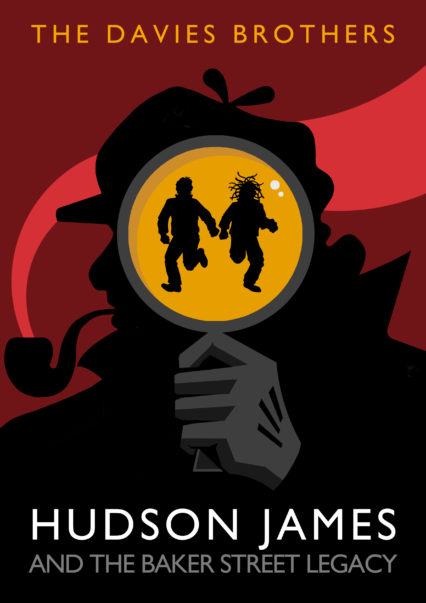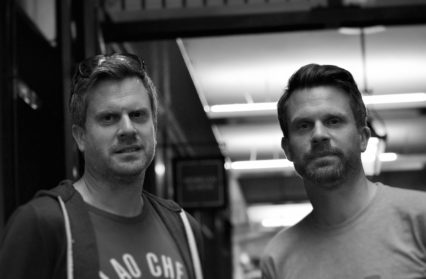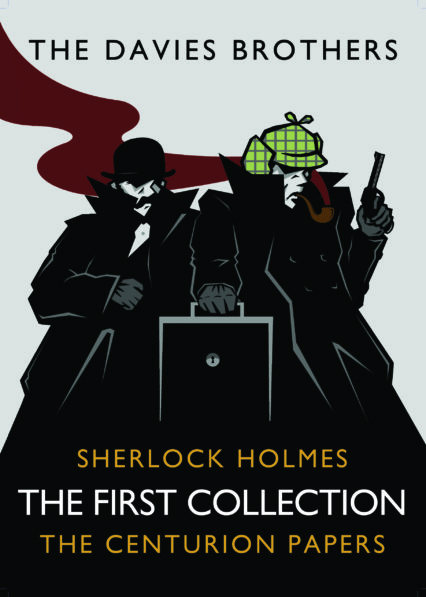The Davies Brothers are Nicholas and Brett Davies, twin brothers who live on opposite sides of the world – Nicholas in Cardiff and Brett in Tokyo. They have written a YA (Young Adults) novel, Hudson James and the Baker Street Legacy, and the ongoing series of mystery stories, Sherlock Holmes: The Centurion Papers– the great detective’s cases that were too ghastly for publication in the nineteenth century! All five stories in the series have made the Top 100 Mystery Bestsellers chart on Amazon in the US, and the First Collection of stories reached Number One in Amazon’s Historical Mysteries chart. In addition to their books, Nicholas and Brett write screenplays, with their first feature film, 3 Days on Planet Earth, currently in pre-production. In September, their script for the YA supernatural adventure drama, Porth Llwyd, was a winner at the BAFTA UK New Writers Showcase.
Wales Arts Review spoke with them about how they work together, re-imagining Sherlock Holmes for a modern audience, and the different crafts of writing for the page and writing for screen.
Writing at opposite ends of the earth
 BRETT: Our process is probably not much different than if we were both living in the same city. When plotting stories or swapping ideas, we spend endless hours on the phone, but when it comes to putting words on the page, we need to work separately. The few times we have tried writing in the same room, we tend to wind each other up (we’re brothers, after all!), so it’s much better for one of us to work on a scene, then the other to come in and edit it afterwards. I’d say that we’re pretty brutal in cutting and changing things the other has written, but we very rarely argue about it. If something doesn’t work for your twin brother, then it probably won’t work for a wider audience.
BRETT: Our process is probably not much different than if we were both living in the same city. When plotting stories or swapping ideas, we spend endless hours on the phone, but when it comes to putting words on the page, we need to work separately. The few times we have tried writing in the same room, we tend to wind each other up (we’re brothers, after all!), so it’s much better for one of us to work on a scene, then the other to come in and edit it afterwards. I’d say that we’re pretty brutal in cutting and changing things the other has written, but we very rarely argue about it. If something doesn’t work for your twin brother, then it probably won’t work for a wider audience.
NICK: Perhaps, uniquely, with us working in different time zones, we can effectively work in shifts on a book or script. I can work on a story into the evening then send whatever I’ve got to Brett who’s just starting his working day. Then, as if by magic, I wake up the following morning to find the previous day’s work edited as well as a whole bunch of brand-new material. It’s like the Elves and the Shoemaker!
Another benefit of having a writing partner is that, even with just the germ of an idea in your head, you immediately have someone to run it past. You get an instant reaction, so you quickly know which ideas are worth pursuing further. Positively, if one of us endorses the other’s concept, then we can embark on writing with real confidence. Any writer is constantly haunted by the nagging question of ‘Is this actually any good?’ With a collaborator, you at least know if one other person likes it.
Recreating the world of Sherlock Holmes
BRETT: We never set out to write Holmes stories initially. We’d always loved Conan Doyle’s books since we were kids, and our plot for Hudson James, our first novel, was a modern-day adventure that used the Holmes canon as part of the backstory. After its release, we got a lot of correspondence from Holmes fans asking whether he appeared in the story, as well as positive comments about those short excerpts of the book that were flashbacks to Victorian London. In response, we wrote a couple of Holmes stories that were well-received, and we’ve kept going since then. Perhaps the most difficult thing is balancing the rather florid Victorian style that Conan Doyle used with the needs of a modern audience who tend to prefer a faster-paced adventure. We’ve tried to bridge this gap by having the stories be “too ghastly for publication” in Holmes’s time, so slightly grittier than the originals.
NICK: One of the first things we discovered is that there are masses of new Sherlock Holmes stories for sale, differing greatly in quality. We wanted ours to feel very authentic and not fall into parody. We both re-read Conan Doyle’s stories, so our language would at least chime with his. We’ve remained committed to writing the stories as if they’ve just been discovered in Dr Watson’s safety deposit box that’s been locked for a hundred years.
NICK: We quickly discovered there’s a huge market for new Holmes stories in the U.S. when most of our early sales came from there, and sales continue to increase. Our first short story crept into some Top 100 bestseller lists – followed quickly by the others. Our First Collection then shot up the charts to be the most-read historical mystery in America! It was an odd feeling to be sat in my house in Riverside thinking thousands of readers were ordering stories I’d been co-writing on that very laptop just a few weeks earlier! I know Brett felt the same in Tokyo.
BRETT: I wonder if the fact that we never targeted the US market is why we’ve done well there. A lot of post-Conan Doyle Holmes stories try too hard to be cosily British whereas Holmes is just part of our DNA. We just tried to write ripping yarns as authentically as possible.
Writing books versus writing screenplays
NICK: During the past year, we’ve been fortunate enough to be working on a sci-fi film script and a television series as well as writing the books – sometimes all on the same day! It’s a lot of fun but requires a shift in discipline. We would both probably agree that writing prose can be a refreshing break from struggling over a particularly difficult scene in a script, while at other times it’s great to dive back into the action of a screenplay. We really appreciate the variety our work offers us.
BRETT: A film screenplay is around 15,000 words compared to a novel being 75,000-plus, which would suggest that scripts are a lot less work to write. However, there is so much weight on each word in a screenplay, with every sentence needing to drive the story forward. Prose writing, on the other hand, gives us the licence to explore characters and ideas more and enjoy playing with the language, so we can easily write a few thousand words a day – even if we know we’re likely to cut a lot of it later. The joy (usually!) of working on a film is the sense of collaboration. It can sometimes feel frustrating to have so many people analysing our work during that process, but it also challenges us to make every scene and every line as spare as possible, stripping off all the fat in order to serve the story.
NICK: Actually, that philosophy of keeping everything as concise and as tight as possible, which is second nature in writing for the screen, is something we transfer to our prose work, especially with short stories. We want them to be as punchy and as enjoyable as possible – if a little gruesome at times.
More information on the Davies Brothers’ books can be found here and www.thedaviesbros.com
Twitter and Facebook: @thedaviesbros
Instagram: the_davies_brothers













